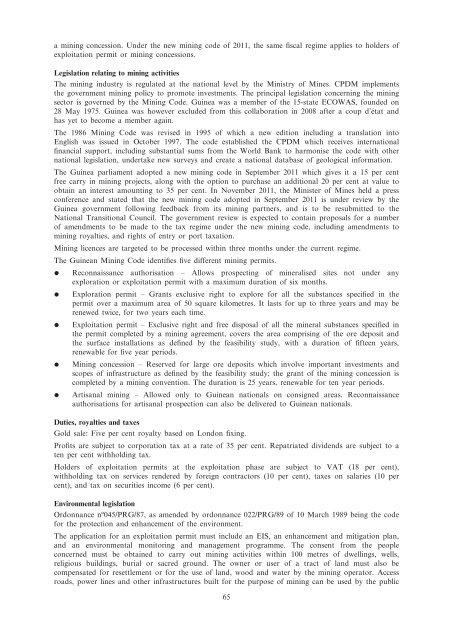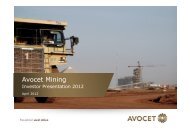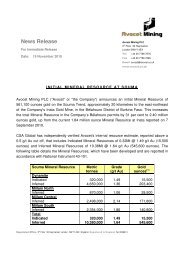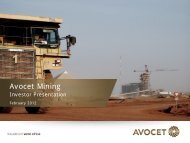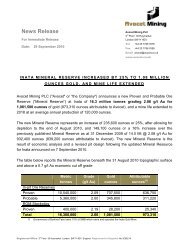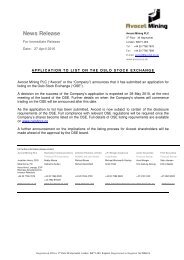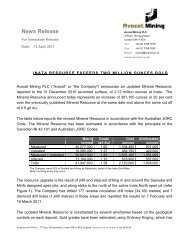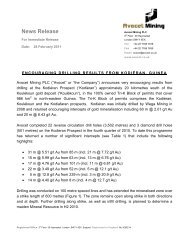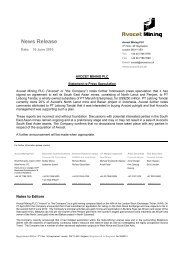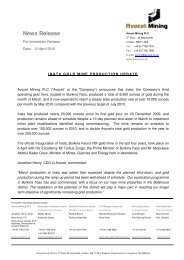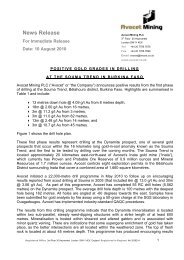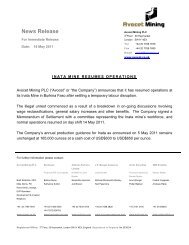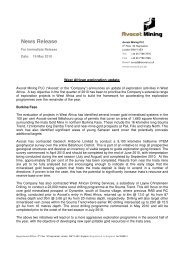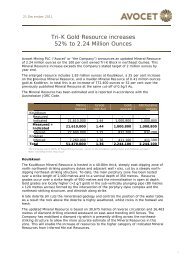Avocet Mining PLC Prospectus December 2011
Avocet Mining PLC Prospectus December 2011
Avocet Mining PLC Prospectus December 2011
Create successful ePaper yourself
Turn your PDF publications into a flip-book with our unique Google optimized e-Paper software.
c105718pu030 Proof 5: 7.12.11_13:38 B/L Revision:<br />
a mining concession. Under the new mining code of <strong>2011</strong>, the same fiscal regime applies to holders of<br />
exploitation permit or mining concessions.<br />
Legislation relating to mining activities<br />
The mining industry is regulated at the national level by the Ministry of Mines. CPDM implements<br />
the government mining policy to promote investments. The principal legislation concerning the mining<br />
sector is governed by the <strong>Mining</strong> Code. Guinea was a member of the 15-state ECOWAS, founded on<br />
28 May 1975. Guinea was however excluded from this collaboration in 2008 after a coup d’état and<br />
has yet to become a member again.<br />
The 1986 <strong>Mining</strong> Code was revised in 1995 of which a new edition including a translation into<br />
English was issued in October 1997. The code established the CPDM which receives international<br />
financial support, including substantial sums from the World Bank to harmonise the code with other<br />
national legislation, undertake new surveys and create a national database of geological information.<br />
The Guinea parliament adopted a new mining code in September <strong>2011</strong> which gives it a 15 per cent<br />
free carry in mining projects, along with the option to purchase an additional 20 per cent at value to<br />
obtain an interest amounting to 35 per cent. In November <strong>2011</strong>, the Minister of Mines held a press<br />
conference and stated that the new mining code adopted in September <strong>2011</strong> is under review by the<br />
Guinea government following feedback from its mining partners, and is to be resubmitted to the<br />
National Transitional Council. The government review is expected to contain proposals for a number<br />
of amendments to be made to the tax regime under the new mining code, including amendments to<br />
mining royalties, and rights of entry or port taxation.<br />
<strong>Mining</strong> licences are targeted to be processed within three months under the current regime.<br />
The Guinean <strong>Mining</strong> Code identifies five different mining permits.<br />
* Reconnaissance authorisation – Allows prospecting of mineralised sites not under any<br />
exploration or exploitation permit with a maximum duration of six months.<br />
* Exploration permit – Grants exclusive right to explore for all the substances specified in the<br />
permit over a maximum area of 50 square kilometres. It lasts for up to three years and may be<br />
renewed twice, for two years each time.<br />
* Exploitation permit – Exclusive right and free disposal of all the mineral substances specified in<br />
the permit completed by a mining agreement, covers the area comprising of the ore deposit and<br />
the surface installations as defined by the feasibility study, with a duration of fifteen years,<br />
renewable for five year periods.<br />
* <strong>Mining</strong> concession – Reserved for large ore deposits which involve important investments and<br />
scopes of infrastructure as defined by the feasibility study; the grant of the mining concession is<br />
completed by a mining convention. The duration is 25 years, renewable for ten year periods.<br />
* Artisanal mining – Allowed only to Guinean nationals on consigned areas. Reconnaissance<br />
authorisations for artisanal prospection can also be delivered to Guinean nationals.<br />
Duties, royalties and taxes<br />
Gold sale: Five per cent royalty based on London fixing.<br />
Profits are subject to corporation tax at a rate of 35 per cent. Repatriated dividends are subject to a<br />
ten per cent withholding tax.<br />
Holders of exploitation permits at the exploitation phase are subject to VAT (18 per cent),<br />
withholding tax on services rendered by foreign contractors (10 per cent), taxes on salaries (10 per<br />
cent), and tax on securities income (6 per cent).<br />
Environmental legislation<br />
Ordonnance nº045/PRG/87, as amended by ordonnance 022/PRG/89 of 10 March 1989 being the code<br />
for the protection and enhancement of the environment.<br />
The application for an exploitation permit must include an EIS, an enhancement and mitigation plan,<br />
and an environmental monitoring and management programme. The consent from the people<br />
concerned must be obtained to carry out mining activities within 100 metres of dwellings, wells,<br />
religious buildings, burial or sacred ground. The owner or user of a tract of land must also be<br />
compensated for resettlement or for the use of land, wood and water by the mining operator. Access<br />
roads, power lines and other infrastructures built for the purpose of mining can be used by the public<br />
65


